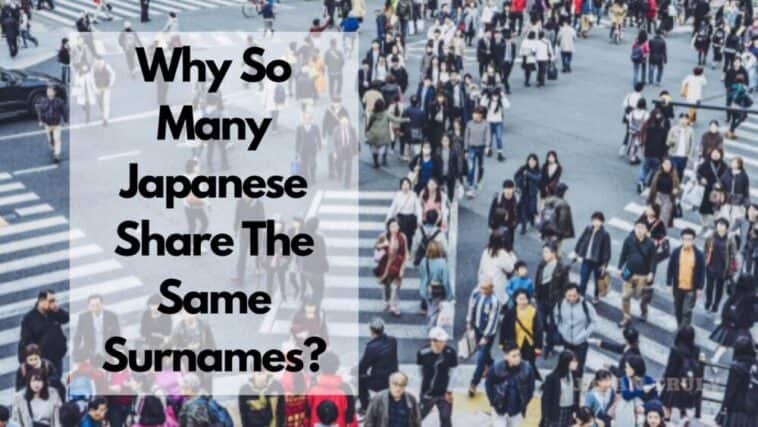Why so many Japanese share the same surnames. Check it out!
In Japan, many individuals share the same surnames, leading to curious glances and sometimes even mistaken identities.
But what lies behind this phenomenon? Let’s delve into the historical, cultural, and legal factors that contribute to the prevalence of shared surnames in Japan.
These common Japanese surnames are not just a matter of historical curiosity but also a contemporary issue in Japanese society.

The Civil Code of Japan, which underscores societal functions and cultural practices, plays a significant role in this aspect.
Despite ongoing discussions and legal challenges, the tradition of shared surnames persists, which underscores their importance in cultural identity as well as the way society is structured.
Key Takeaways
- Japanese surnames are rooted in historical practices that became widespread in the 19th century.
- Contemporary debates on surnames in Japan involve interpretations of the country’s Civil Code.
- Shared surnames remain integral to Japanese culture and social identity.
Page Contents
Why So Many Japanese Share The Same Surnames?
In Japan, limited surname options after the Meiji Restoration, coupled with cultural emphasis on family unity and a law requiring married couples to share names, led to millions sharing the same common surnames, creating identity challenges and sparking debates on individual rights and potential future changes.
- Related:
Historical Context of Japanese Surnames
When investigating the historical context of Japanese surnames, key factors include specific governmental reforms and societal structures that shaped the naming conventions we see today.
The evolution from exclusive aristocratic and samurai usage to a more inclusive system for commoners reveals much about Japan’s history and social stratification.
Japanese Surnames During the Edo Period
During the Edo Period, I understand surnames were a privilege of the elite. Only the aristocratic and samurai classes carried surnames, while commoners were only recognized by their given names. This distinction was a reflection of the rigid social hierarchy that characterized Japanese society for centuries.
Change in Japanese Surnames In The Meiji Era Reforms
In the Meiji Era, a transformation unfolded when the Meiji government mandated surnames for all citizens as part of its modernization efforts. This decree, known as the Family Registration Law of 1875, aimed to systematize personal identification and align Japan with Western practices.
Consequently, many commoners either adopted the surnames of their landlords or crafted their own based on geographical features or occupations.
Modern Societal Impact
Today, the historical roots of Japanese surnames continue to impact society, with a significant majority sharing a relatively small pool of family names.
The reasons for this phenomenon stem from the naming patterns established in the Meiji Era and the limited number of characters used to create these names.
Although reforms have since simplified these conventions, the patterns set during significant historical periods still heavily influence present-day surname usage in Japan.
Legal Framework and Civil Codes
In my exploration of Japan’s unique approach to surnames, I’ll focus on the pertinent legal infrastructure, specifically examining the Civil Code and how it has been upheld by the Supreme Court.
The Implementation of Article 750
Article 750 of Japan’s Civil Code is a cornerstone in the country’s approach to family names. It mandates that married couples must choose the same surname to legally recognize their union. Historically, this has led to a prevalence of shared surnames among families, with one spouse, often the wife, changing their original surname.
Supreme Court Rulings and Debates on Japanese Surnames
Japan’s Supreme Court has consistently ruled that the provisions forcing couples to share a surname are constitutional, affirming the tradition’s legality.
Debate surrounds this topic, with some viewing it as an infringement on personal rights, while others see it as a cultural norm. These rulings anchor the practice firmly within the framework of Japanese law.
Cultural and Social Practices Around Surnames In Japan
In exploring the reasons behind the prevalence of common surnames in Japan, I find that deep-rooted social conventions and cultural practices play pivotal roles.
These customs are particularly evident in the realms of marital surname traditions and gender-based name change protocols.
Married Couples and Surname Conventions in Japan
Japanese culture highly values family unity; thus, it is a long-standing social norm for married couples to share the same surname. This tradition underscores a societal view that regards the family as a cohesive unit.
The practice is so ingrained that until recently, a legal framework required married couples to adopt a single surname, typically that of the husband, emphasizing a gender-specific influence on naming conventions.
This has led to a situation where many women are expected to change their last names upon marriage.
Gender Roles and Name Change Traditions in Japan
The expectation for women to adopt their husband’s surname after marriage is reflective of traditional gender roles within Japanese society.
Although these customs are deeply entrenched, there is a growing call for diversity and social change. Efforts to amend these conventions align with broader societal shifts towards gender equality.
The push towards legalizing dual surnames for married couples serves as an exemplar of societal evolution, highlighting a changing attitude towards traditional gender roles and the broader implications for Japanese culture and society.
The intertwining of social norms with individual identity in Japan illustrates how personal names function beyond simple identifiers; they are emblematic of cultural values and social expectations.
Contemporary Issues and Progress
The debate surrounding Japan’s surname law reflects a society at a crossroads, grappling with balancing tradition and modernization in the face of evolving public sentiment.
Challenges to Existing Legislation
In Japan, a longstanding system requires married couples to adopt a single surname, traditionally that of the husband. This practice has been considered outdated by many, as it does not accommodate diverse family structures or personal choice.
Legal challenges to this legislation highlight ongoing discrimination; women in the workforce, for example, may feel pressured to choose between career and family due to potential stigmatization or confusion.
The Liberal Democratic Party, which has held power almost continuously since 1955, has shown reluctance to adjust this aspect of the family system, contrary to growing support for change among voters.
Changing Perspectives and Reforms
Evolving opinions indicate a significant shift among the Japanese public, with many now supporting options for dual-surname for married couples and broader gender equality.
Reforms, however, are slow-moving, as they are entangled with deep-seated cultural norms and the legislative process within the Diet, Japan’s parliament.
Yet, the increasing discourse on flexible surname options signifies progress in society’s recognition of individual autonomy and diversity.
The Ruling Liberal Democratic Party faces growing pressure to adapt the current laws to better reflect today’s societal values and the economic imperative of maximizing participation in the workforce without gender-based limitations.
Japanese Surnames: FAQs
In this section, I’ll address some common questions related to the widespread occurrence of particular surnames in Japan, exploring historical elements, cultural nuances, and societal impacts of Japanese naming traditions.
What historical factors contribute to the prevalence of common surnames in Japan?
Historically, surnames were exclusive to the aristocracy and samurai classes in Japan. It was only in the 19th century that the practice of having a surname was extended to the broader population, which led to the creation of many common surnames.
How does the Japanese naming system influence the frequency of certain last names?
In Japan, family names often derive from geographical features or occupational words. This system results in high frequencies of certain surnames, as many families chose names common to their areas or trades.
What are the cultural implications of addressing someone by their first name versus their surname in Japan?
Using a person’s first name is typically reserved for close acquaintances, family, and friends, indicating a personal relationship. In contrast, addressing someone by their surname demonstrates respect and a more formal social distance.
In what ways does the tradition of family names affect social interactions in Japanese society?
The use of family names in social interactions underscores the importance of respect, hierarchy, and formality in Japanese culture. It often dictates the language and behavior expected in various social settings.
How do naming conventions in Japan differ from those in Western cultures, specifically regarding the order of names?
Japanese naming order places the family name before the given name, which is the opposite of the typical Western name order. This reflects the emphasis on the collective over the individual in Japanese society.
What is the significance of adding the honorific ‘San’ to a Japanese last name?
The honorific ‘San’ attached to a surname is a general term of respect, akin to ‘Mr.,’ ‘Mrs.,’ or ‘Ms.’ in English. Its use is widespread and serves as a fundamental aspect of polite Japanese communication.
My writing focuses on the various aspects of Japanese lifestyle, from traditional tea ceremonies and flower arrangement to modern fashion trends and pop culture. Through my articles, I aim to share my passion for Japan and provide readers with a glimpse into the rich and diverse world of Japanese culture.
I believe that the key to understanding Japanese lifestyle is to appreciate the balance between tradition and innovation. While Japan has a rich cultural heritage that dates back centuries, it is also a country that is constantly evolving and embracing new ideas and technologies.
Whether you’re interested in learning about the latest fashion trends in Tokyo, or want to explore the ancient art of calligraphy, my writing will take you on a journey through the many facets of Japanese lifestyle. So join me as we explore the beauty and complexity of this fascinating culture together!





